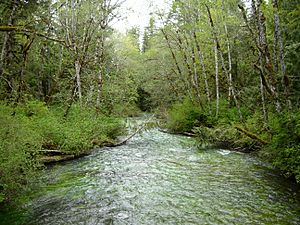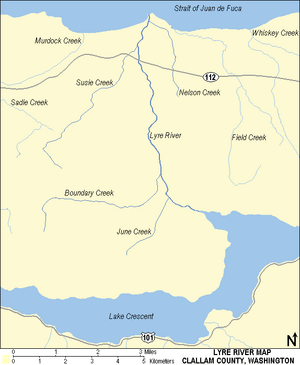Lyre River facts for kids
Quick facts for kids Lyre River |
|
|---|---|

The Lyre River as it flows out of Lake Crescent
|
|
 |
|
| Country | United States |
| State | Washington |
| County | Clallam |
| Physical characteristics | |
| Main source | Lake Crescent Olympic National Park 586 ft (179 m) 48°5′40″N 123°48′17″W / 48.09444°N 123.80472°W |
| River mouth | Strait of Juan de Fuca 0 ft (0 m) 48°9′38″N 123°49′43″W / 48.16056°N 123.82861°W |
| Length | 5.2 mi (8.4 km) |
| Basin features | |
| Basin size | 67.5 sq mi (175 km2) |
| Tributaries |
|
The Lyre River is a short but important river in the state of Washington, United States. It flows out of Lake Crescent in the beautiful Olympic National Park. From there, it makes its way to the Strait of Juan de Fuca, which is a large body of water connecting to the Pacific Ocean.
Native American tribes who lived near the river once called its waters "singing waters." In 1790, a European explorer named Gonzalo López de Haro named it Rio de Cuesta. Later, in 1847, Captain Henry Kellett charted the river and gave it the name River Lyre.
The River's Journey
The Lyre River starts its journey from Lake Crescent and flows mostly northwest. Early on, it meets June Creek. Then, it turns north when Boundary Creek joins it from the left side.
About 2.7 miles (4.3 kilometers) from its mouth, the river drops over the Lyre River Falls. These falls are too high for fish to swim upstream past them. As the river continues north, Susie Creek joins it from the left, and then Nelson Creek joins from the right. Finally, the Lyre River empties into the Strait of Juan de Fuca at a spot called Low Point.
River Animals and Plants
The first part of the Lyre River, right where it leaves Lake Crescent, is a special place for a unique fish called the Beardslee trout. This type of trout is found only in this specific area.
Below the Lyre River Falls, which are about 3 miles (4.8 kilometers) from the river's mouth, other fish live. These include coastal cutthroat trout and different kinds of steelhead (which are a type of rainbow trout that migrates to the ocean).
A Look at History
The Makah tribe, a Native American group, saw the Lyre River as their eastern border. However, members of the Elwha Klallam tribe also had villages along the river, including a fishing village called Kwahamish.
In the early 1890s, settlers began to claim land near the river. John Smith settled in Piedmont, and John Hanson and his wife Mary Laeger Hanson made their home near the start of the Lyre River.
From 1889 until the 1920s, there was a town called Gettysburg on the east side of the river's mouth. Robert Getty founded Gettysburg as a town for logging. In 1910, it had about 65 people and even its own post office.
Today, the Lyre River Campground is located near the river's mouth. It is managed by the Washington Department of Natural Resources.
See also
 In Spanish: Río Lyre para niños
In Spanish: Río Lyre para niños
 | Isaac Myers |
 | D. Hamilton Jackson |
 | A. Philip Randolph |

